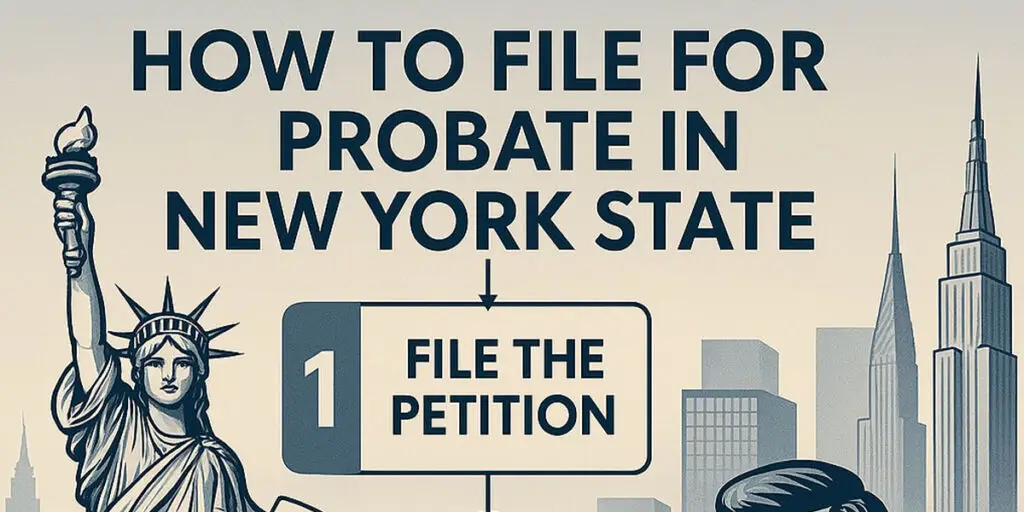How to File for Probate in New York State: A Comprehensive Guide
Filing for probate in New York State can seem like a daunting task, especially while grieving the loss of a loved one. Probate is the legal process of administering a deceased person’s estate, involving validating a will (if one exists), identifying and valuing assets, paying debts and taxes, and distributing the remaining assets to beneficiaries. Understanding the steps involved is crucial for ensuring a smooth and efficient estate administration. This comprehensive guide will walk you through the process of filing for probate in New York, providing clear instructions and valuable resources to help you navigate each stage. The team at Morgan Legal Group for probate is ready to assist you.
This article will cover a range of essential topics, including determining if probate is necessary, gathering the required documents, completing the probate petition, filing the petition with the Surrogate’s Court, notifying interested parties, and handling potential challenges that may arise. We’ll also discuss the role of the executor, the importance of working with a probate attorney, and provide actionable advice for ensuring a successful probate proceeding. Whether you are an executor, administrator, or beneficiary, this guide will provide valuable insights and practical guidance for filing for probate in New York State.
Determining if Probate is Necessary in New York
Before embarking on the probate process, it’s essential to determine whether probate is actually required. In New York, probate is generally necessary when a person dies owning assets in their name alone. This includes real estate, bank accounts, investments, and personal property. However, there are several exceptions to this rule.
Assets that are held jointly with another person with rights of survivorship, assets that have a designated beneficiary (such as life insurance policies or retirement accounts), and assets that are held in a trust typically pass directly to the surviving owner or beneficiary without going through probate. Additionally, suppose the deceased person’s estate is small enough. In that case, it may be eligible for a simplified probate process called “small estate administration,” which is less complex and time-consuming than regular probate. Consult with a skilled attorney to discuss if probate is even necessary for your circumstance.
Gathering the Required Documents for Probate
The first step in filing for probate is to gather all of the required documents. These documents are essential for initiating the probate proceeding and providing the Surrogate’s Court with the information it needs to administer the estate. The specific documents required may vary depending on the circumstances of the case, but generally include the following:
- Original Will (if one exists): The original will is the most important document in a probate proceeding. It must be the original, not a copy, and it must be signed and witnessed in accordance with New York law. If the original will cannot be located, it may be possible to probate a copy, but this will require additional legal steps.
- Death Certificate: A certified copy of the death certificate is required to prove that the person has died. You can typically obtain a death certificate from the New York State Department of Health or from the local health department in the county where the person died.
- Probate Petition: The probate petition is a legal document that formally requests the Surrogate’s Court to admit the will to probate and appoint an executor to administer the estate. The petition must be completed accurately and thoroughly. We’ll get into this later!
- List of Assets: A list of all of the deceased person’s assets is required, including real estate, bank accounts, investments, personal property, and any other assets that the deceased person owned at the time of their death. You should include the estimated value of each asset.
- List of Heirs and Beneficiaries: A list of all of the deceased person’s heirs and beneficiaries is required, including their names, addresses, and relationships to the deceased person. Heirs are the individuals who would inherit the estate if there were no will. Beneficiaries are the individuals who are named in the will to inherit the estate.
Gathering all of these documents can take some time and effort. It’s important to be organized and to keep track of all of the documents you have collected. If you are having trouble locating any of the required documents, an experienced probate attorney can assist you.
Completing the Probate Petition in New York
The probate petition is a crucial document in the probate process. It provides the Surrogate’s Court with all of the information it needs to initiate the probate proceeding and appoint an executor to administer the estate. The petition must be completed accurately and thoroughly, and it must be signed by the person who is requesting to be appointed as executor.
The specific form of the probate petition may vary depending on the Surrogate’s Court in the county where you are filing. However, most probate petitions include the following information:
- Deceased Person’s Information: The petition must include the deceased person’s name, address, date of death, and other identifying information.
- Will Information: If there is a will, the petition must include information about the will, such as the date it was signed, the names of the witnesses, and the location of the original will.
- Executor Information: The petition must include the name, address, and relationship to the deceased person of the person who is requesting to be appointed as executor.
- Heir and Beneficiary Information: The petition must include the names, addresses, and relationships to the deceased person of all of the heirs and beneficiaries.
- Asset Information: The petition must include a list of all of the deceased person’s assets and their estimated values.
Completing the probate petition can be complex, especially for individuals who are not familiar with legal terminology and procedures. It’s always best to consult with an experienced probate attorney to ensure that the petition is completed accurately and thoroughly.
Filing the Probate Petition with the Surrogate’s Court
Once you have completed the probate petition and gathered all of the required documents, the next step is to file the petition with the Surrogate’s Court in the county where the deceased person resided. The filing fee varies depending on the size of the estate. You can pay the filing fee with cash, check, or credit card.
When you file the petition, the court clerk will assign a file number to the case and schedule a court date for a hearing. The hearing is an opportunity for interested parties to appear before the court and raise any objections to the probate proceeding.
After you file the petition, you will need to obtain a citation from the court. The citation is a legal document that notifies interested parties that the probate proceeding has been commenced. You will need to arrange for the citation to be served on all interested parties in accordance with the court’s rules, which typically require personal service or service by mail. At Morgan Legal Group’s Russel Morgan Esq. can assist you with this crucial step.
Notifying Interested Parties of the Probate Proceeding
Notifying interested parties is a crucial step in the probate process. It ensures that all individuals who may have a stake in the estate are aware of the proceeding and have an opportunity to protect their rights. Interested parties typically include the deceased person’s heirs, beneficiaries, and creditors.
The specific requirements for notifying interested parties vary depending on the Surrogate’s Court and the circumstances of the case. However, generally, you will need to serve each interested party with a copy of the citation and a copy of the probate petition. You will also need to file proof of service with the court to show that each interested party has been properly notified.
If you are unable to locate an interested party, you may need to seek permission from the court to serve them by alternative means, such as publication. Serving interested parties can be a complex process, and it’s important to comply with all of the court’s requirements to avoid delays or legal challenges.
What Happens After the Probate Petition is Filed?
After the probate petition is filed and interested parties have been notified, the Surrogate’s Court will review the petition and the supporting documents to determine whether the will is valid and whether the person requesting to be appointed as executor is qualified to serve.
Suppose the court is satisfied that the will is valid and that the person is qualified to serve as executor. In that case, it will issue a decree admitting the will to probate and appointing the person as executor. The court will also issue Letters Testamentary, which are legal documents that authorize the executor to act on behalf of the estate. This allows the executor to access account information and make financial and legal choices. Morgan Legal Group will assist you. Contact us to start today!
If there are any objections to the probate proceeding, such as a challenge to the validity of the will, the court will schedule a hearing to resolve the dispute. The hearing may involve testimony from witnesses, review of documents, and legal arguments from attorneys.
The Role of the Executor in the Probate Process
The executor is the person who is responsible for administering the estate after the will has been admitted to probate. The executor has a fiduciary duty to act in the best interests of the estate and to carry out the deceased person’s wishes as expressed in the will. Fulfilling that requirement isn’t always easy, but a good lawyer will help you manage these requirements with respect.
The executor’s responsibilities typically include:
- Identifying and Valuing Assets: The executor must identify and value all of the deceased person’s assets, including real estate, bank accounts, investments, personal property, and any other assets that the deceased person owned at the time of their death.
- Paying Debts and Taxes: The executor must pay all of the deceased person’s debts and taxes, including credit card bills, mortgages, medical expenses, and any other obligations that the deceased person owed at the time of their death.
- Managing Assets: The executor must manage the estate assets prudently and responsibly. This may involve selling assets, investing funds, or renting out property.
- Distributing Assets to Beneficiaries: The executor must distribute the remaining assets to the beneficiaries in accordance with the terms of the will.
- Filing Accountings with the Court: The executor must file accountings with the court to show how the estate assets have been managed and distributed.
The executor’s responsibilities can be complex and time-consuming. It’s always best to seek legal guidance from an experienced probate attorney to ensure that you are fulfilling your duties properly and protecting the interests of the estate.
Potential Challenges in the Probate Process
The probate process can be challenging, even in the most straightforward cases. Here are some common challenges that can arise during probate:
Will Contests
A will contest is a legal challenge to the validity of a will. Will contests can be based on a variety of grounds, such as allegations of fraud, undue influence, or lack of testamentary capacity (meaning that the deceased person was not of sound mind when they signed the will). Will contests can be costly and time-consuming, and they can delay the administration of the estate.
Asset Valuation Disputes
Disputes can arise over the value of the deceased person’s assets. This is particularly common with assets that are difficult to value, such as real estate, artwork, or business interests. Asset valuation disputes can delay the administration of the estate and increase the legal fees.
Creditor Claims
Creditors may file claims against the estate for debts that the deceased person owed at the time of their death. The executor must review these claims and determine whether they are valid. If a claim is valid, the executor must pay it from the assets of the estate. Creditor claims can reduce the amount of assets that are available for distribution to the beneficiaries.
Family Disputes
Family disputes are common during the probate process. These disputes can arise over a variety of issues, such as the validity of the will, the value of the assets, or the distribution of the assets. Family disputes can delay the administration of the estate and increase the legal fees.
The Importance of Working with a Probate Attorney
Navigating the probate process can be challenging, especially for individuals who are not familiar with the legal procedures involved. Working with an experienced probate attorney can provide valuable benefits. An attorney can navigate NY Courts , and will ensure that the process goes smoothly.
Expert Guidance and Personalized Solutions
A probate attorney can provide expert guidance on all aspects of the probate process. They can assess your specific situation, identify potential issues, and develop customized solutions that meet your needs. They can also explain the legal implications of different strategies and help you make informed decisions.
Ensuring Legal Compliance
A probate attorney can ensure that you comply with all applicable laws and procedures. Probate laws are complex and vary from state to state. An attorney can help you avoid common mistakes that can delay the administration of the estate or result in legal challenges.
Minimizing Stress and Burden
The probate process can be stressful and time-consuming. A probate attorney can handle many of the administrative tasks involved, such as filing documents with the court, notifying interested parties, and communicating with creditors. This can significantly reduce the stress and burden on the executor or administrator.
Protecting Your Rights and Interests
A probate attorney can protect your rights and interests throughout the probate process. This is particularly important if there are disputes among the beneficiaries or challenges to the will. An attorney can advocate on your behalf and ensure that your voice is heard in court.
Resources for Filing for Probate in New York State
There are several resources available to help you file for probate in New York State:
- Surrogate’s Court: The Surrogate’s Court is the court that oversees the probate process. The court has a website with information about probate procedures and forms. Check these out for the counties we support: New York, Long Island, and NYC.
- New York State Bar Association: The New York State Bar Association has a section on trusts and estates law. The website has information about estate planning and probate.
- Legal Aid Society: The Legal Aid Society provides free legal services to low-income individuals. They may be able to help you with probate if you meet their eligibility requirements. Contact us to determine whether your case meets our requirements and to begin
Taking the Next Step: Contact Morgan Legal Group Today
Filing for probate in New York State can be a complex process, but it doesn’t have to be overwhelming. By understanding the steps involved and the resources available to help you, you can ensure a smooth and efficient estate administration. If you are facing the probate process, consider working with an experienced probate attorney who can provide expert guidance and personalized solutions. At Morgan Legal Group, we are dedicated to providing comprehensive probate services to families throughout New York City and beyond. It is essential to ensure that you have a guide to help you through this tough process! Book Appointment Services with the team at Morgan Legal Group and begin to develop a sound plan that is designed to assist you today. Reach out to some of the counties that we provide assistance:
Reach out to our services in Brooklyn, the Bronx, and Queens
Check us out in these additional areas: Staten Island, Westchester, Albany, Suffolk County, Ulster County, and Orange County.









